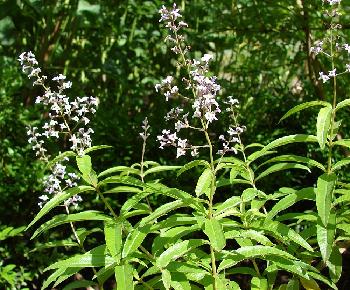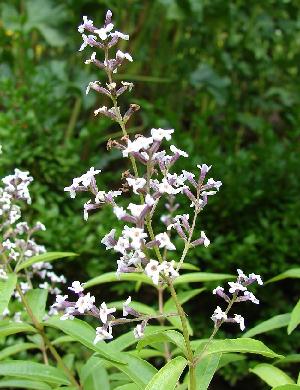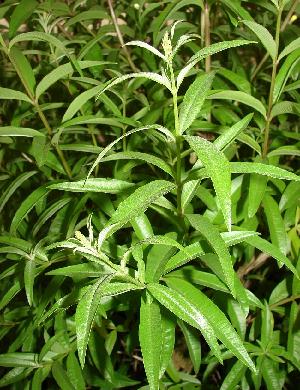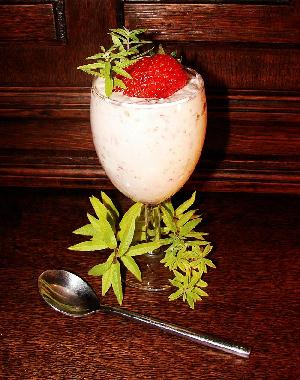Lemon Verbena

Aloysia triphylla (Lippia citriodora)
If you had asked me 10 years ago what my favourite lemon scented herb was, I would have replied lemon balm without a doubt. That was until I discovered lemon verbena. Since then it's been my favourite lemony herb.
I use the leaves in sweet and savoury dishes, homemade pot pourris, scented sachets and bath teas. Also, the essential oil is superb for waking me up and giving me a mental boost. I call it 'cobweb busting oil', because of how it clears my mind.
As a herb or garden plant lemon verbena isn't as widely used in the kitchen or as part of home remedies as it should be. Only 100 years ago, it was a common ornamental plant found in European gardens, but today it is rarely planted. I was pleased on a recent trip to Erdigg, an 18th century country house in Wrexham, to see lemon verbena incorporated into their herb borders along side hyssop, tansy and soapwort. The delights of lemon verbena in the kitchen have also fallen by the wayside; although to be fair, lemon verbena has never played an important part in European cookery.
History & Folklore
Lemon verbena is also known as Cedron, Lemon Beebrush, Lemon Luisa and Yerba Louisa. The last two names are said to be because the plant was named after Marie Louisa, Princess of Parma (1748 - 1819), who later became Queen of Spain. Whether this is true, I haven't been able to determine with any degree of certainty, but it was the Spanish who brought lemon verbena to Europe in the 18th century, where it was used in perfume and is still widely used in perfume blends today such as Givenchy's 'Very Irresistible'. Speaking of perfumes, did you know that in 'Gone with the Wind', Scarlett O'Hara's mother Margaret Mitchell and Little House on the Prairie's Laura Ingalls both declared that lemon verbena was their favourite scent?
In folklore lemon verbena is linked with purification and love and was said to help attract a suitor. Made as a tea, lemon verbena is said to prevent a person from dreaming.
Description

Lemon verbena is a deciduous perennial shrub native to South America, but is now found in North America and Europe. It is not a showy plant, but it does have attractive leaves and should always be included in herbs gardens designed for scent, pot pourri and culinary uses. Its flowers are fairly unassuming, although more noticeable than flowers of say vervain. The plant grows to a height of 2 metres and gives out a powerful lemony scent which intensifies when the leaves are rubbed or crushed.
Growing
Lemon verbena prefers full sun, a lot of water, and a rich, free-draining soil which retains some moisture but doesn't become soggy. It is a tender deciduous shrub, although I've found that as we seem to be getting milder winters these days, my plants are surviving the winter with no protection and bouncing back, come the following spring to give another crop of wonderfully fragrant leaves. The light green leaves are lancet shaped, and its tiny flowers bloom lavender or white in August or September. Pinch out the tips of the stems to keep the plant bushy or else it will end up leggy and produce fewer leaves.
I have noticed that if you keep the plants in small pots then the plant and the leaf size is small. Plant directly in the ground and the plant grows taller and the leaves are longer. However the smaller leaves to me have the best fragrance. I assume that, if the plant doesn't put all its energy into growing tall, it focuses instead on its fragrance. Of course this could be coincidence and there may be other reasons, but I'd be interested to hear via the forum if anybody else has experienced similar results?
Lemon verbena is best propagated by cuttings taken in summer. Place the cuttings in the shade and keep them well watered or they will wilt and die.
The plant suffers from few pests. The most common are red spider mites and whitefly. To help eradicate both of these, regularly mist and wash the leaves, especially their undersides.
You can harvest sprigs all summer, but leave your main harvest until midsummer when you can also prune and shape the plant and take it indoors or into a greenhouse before the frosts kill the plant off.
General Use

I don't understand why lemon verbena isn't used more. Is it because it doesn't seem to feature in many recipes unlike herbs such as sage and time? Or maybe its medicinal uses are limited? By the time you've read this article, if you don't already grow and use lemon verbena, I hope that you'll have a go and try some of its many uses and experience the fragrance for yourself. The leaves not only dry easily, but they hold their scent well. Place them between linens to help keep them smelling sweet and add to homemade pot-pourri.
The oil has been used in cologne, toilet water, perfume, and soap. A strong infusion can be made from the leaves and added to the bath. Also, the leaves can be added to cider vinegar to make a fabulous skin tonic that helps to softens and freshen the skin.
A non edible use that should make lemon verbena popular in the summer months is that the growing plant repels midges, flies and other insects. So grow it underneath windows and near doorways.
Medicinal Use
Lemon verbena isn't used to so much medicinally on a grand scale in the way that sage, mint and thyme are. It can be used as an aid to digestion and allegedly has a tonic effect on the stomach and intestines.
Tea made from dried lemon verbena can be mildly sedative if taken at night with a spoonful of honey added. It's also good for congestion and can ease indigestion but long term use or high doses can irritate the stomach. An infusion of the leaves can be added to your bath water to help calm and soothe the senses; the same infusion is also reputed to help clean the teeth. A compress of the leaves can help to reduce puffiness around the eyes. Lemon verbena oil makes a wonderful massage oil when diluted with suitable carrier oil; use to help ease cramps and indigestion. It can also be used for anxiety, insomnia, nervous tension and stress. Lemon verbena blends well with lavender, rosemary, palmarosa, orange and other citrus oils. Lemon verbena has febrifuge, stomachic, antispasmodic and sedative properties, and can be used to treat dyspepsia, indigestion and flatulence.
Caution - Prolonged use or large internal doses can cause gastric irritation. This is a photosensitising oil so do not use before going out into the sun.; It can also irritate sensitive skin.
Culinary Use
Lemon verbena has the most intense, lemon-like scent of all the lemon scented herbs. Use the leaves for making herbal vinegars, teas and to add a refreshing zing to homemade lemonade. They also work well with vanilla and raspberries to make a delicious ice-cream. Partnered with lemon thyme, lemon verbena makes delicious herb butter for drizzling over steak and corn on the cob for a summer barbecue. The leaves add a lemony flavour to fish, poultry and white meat dishes, vegetable marinades, salad dressings, jams, jellies, puddings especially fruit salads and fruit based drinks.
Back in June I attended the Herb Society's President's Day. The guest of honour was Sophie Grigson who was President of the Herb Society in 2006. During a cookery demonstration, Sophie, confessed her love for lemon verbena and created the most delicious summertime recipe using strawberries, mascarpone cheese and lemon verbena. This recipe, along with others such as sweet potato and bergamot bhaji's that Sophie demonstrated that day, were featured in the Herb Society's journal Herbs, volume number 32.3. The recipes can also be found in Sophie's book 'Herbs' published by BBC Worldwide (ISBN 978-0563384427). Chatting to Sophie after the event she kindly gave her permission for me to include the the following recipe here. Please do try it, it's simply heavenly!
Recipe:
Strawberry, Lemon Verbena and Mascarpone Fool

Serves 3- 4
- A small handful of lemon verbena leaves
- 45g (1½oz) Sugar Cubes
- 340g (12oz) Ripe Strawberries (hulled)
- 250g (9oz) Mascarpone Cheese
- Few springs of lemon verbena for decoration.
Method - Put the lemon verbena leaves into a mortar or strong bowl, with the sugar cubes. Pound with a pestle or the end of a rolling pin, until the sugar is crushed, and the lemon verbena leaves have disintegrated, colouring the sugar a beautiful green.
Now crush the strawberries with a fork (a food processor is too harsh). Gradually work the crushed strawberries into the mascarpone cheese, with enough of the verbena sugar to sweeten to taste. Spoon into individual dishes or glasses and serve topped with a spring of lemon verbena and a strawberry fan.
A point worth noting if you make the above recipe, or use lemon verbena in any culinary dish, is that the leaf is rather coarse. When I ground the herb with the sugar in the above recipe, it left little 'strands' of verbena but these can be removed before adding to your strawberry and mascarpone mixture. It wouldn't be much of a bother if the strands are left in, but chopping the lemon verbena leaves before you grind them with the sugar helps to make the strands shorter and makes grinding them to nothing easier.
by Debs Cook
